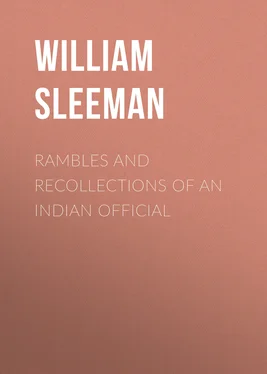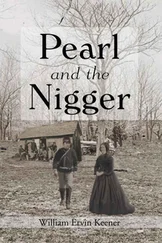William Sleeman - Rambles and Recollections of an Indian Official
Здесь есть возможность читать онлайн «William Sleeman - Rambles and Recollections of an Indian Official» — ознакомительный отрывок электронной книги совершенно бесплатно, а после прочтения отрывка купить полную версию. В некоторых случаях можно слушать аудио, скачать через торрент в формате fb2 и присутствует краткое содержание. Жанр: Путешествия и география, История, foreign_edu, foreign_antique, foreign_prose, на английском языке. Описание произведения, (предисловие) а так же отзывы посетителей доступны на портале библиотеки ЛибКат.
- Название:Rambles and Recollections of an Indian Official
- Автор:
- Жанр:
- Год:неизвестен
- ISBN:нет данных
- Рейтинг книги:4 / 5. Голосов: 1
-
Избранное:Добавить в избранное
- Отзывы:
-
Ваша оценка:
- 80
- 1
- 2
- 3
- 4
- 5
Rambles and Recollections of an Indian Official: краткое содержание, описание и аннотация
Предлагаем к чтению аннотацию, описание, краткое содержание или предисловие (зависит от того, что написал сам автор книги «Rambles and Recollections of an Indian Official»). Если вы не нашли необходимую информацию о книге — напишите в комментариях, мы постараемся отыскать её.
Rambles and Recollections of an Indian Official — читать онлайн ознакомительный отрывок
Ниже представлен текст книги, разбитый по страницам. Система сохранения места последней прочитанной страницы, позволяет с удобством читать онлайн бесплатно книгу «Rambles and Recollections of an Indian Official», без необходимости каждый раз заново искать на чём Вы остановились. Поставьте закладку, и сможете в любой момент перейти на страницу, на которой закончили чтение.
Интервал:
Закладка:
315
Since the author's time certain industries, the most important being cotton-pressing, cotton-spinning, and jute-spinning, have sprung up and assumed in Bombay, Calcutta, Cawnpore, and a few other places, proportions which, absolutely, are large. But India is so vast that these local developments of manufactures, large though they are, seem to be as nothing when regarded in comparison with the country as a whole. India is still, and, to all appearance, always must be, essentially an agricultural country.
316
The author's teaching concerning freedom of trade in times of famine and the function of dealers in corn is as sound as his doctrine of famine relief. The 'vulgar prejudice', which he denounces, still flourishes, and the 'sad delusion', which he deplores, still obscures the truth. As each period of scarcity or famine comes round, the old cries are again heard, and the executive authorities are implored and adjured to forbid export, to fix fair prices, and to clip the profits of the corn merchant. During the Bengal famine of 1873-4, the demand for the prohibition of the export of rice was urged by men who should have known better, and Lord Northbrook is entitled to no small credit for having firmly withstood the clamour. The more recent experiences of the Russian Government should be remembered when the clamour is again raised, as it will be. The principles on which the author acted in the crisis at Sāgar in 1833 should guide every magistrate who finds himself in a similar position, and should be applied with unhesitating firmness and decision.
317
Ante , Chapter 24, following note [4].
318
Sāgar was ceded by the Peshwa in 1818, and a yearly sum of two and a half lakhs of rupees was allotted by Government for pensions to Rukmā Bāī, Vināyak Rāo, and the other officers of the Marāthā Government. A descendant of Rukmā Bāī continued for many years to enjoy a pension of R.10,000 per annum (C.P. Gazetteer (1870), p, 442). The lady referred to in the text seems to be Rukmā Bāī.
319
A village about twenty miles north-west of Sāgar. The estate consists of twenty-six revenue-free villages.
320
The Jewish ceremonial is described in Leviticus xvi. 20-26. After completing the atonement for the impurities of the holy place, the tabernacle, and the altar, Aaron was directed to lay 'his hands upon the head of the live goat', so putting all the sins of the people upon the animal, and then to 'send him away by the hand of a fit man into the wilderness; and the goat shall bear upon him all their iniquities unto a land not inhabited: and he shall let go the goat in the wilderness'. The subject of scape-goats is discussed at length and copiously illustrated by Mr. Frazer in The Golden Bough , 1st ed., vol. ii, section 15, pp. 182-217; 3rd ed. (1913) Part VI. The author's stories in the text are quoted by Mr. Frazer.
321
During the season of 1816-17 the ravages of the Pindhārīs were exceptionally daring and extensive. The Governor-General, the Marquis of Hastings, organized an army in several divisions to crush the marauders, and himself joined the central division in October 1817. The operations were ended by the capture of Asīrgarh in March 1819.
322
The people in the Sāgar territories used to show several decayed mango-trees in groves where European troops had encamped during the campaigns of 1816 and 1817, and declared that they had been seen to wither from the day that beef for the use of these troops had been tied to their branches. The only coincidence was in the decay of the trees, and the encamping of the troops in the groves; that the withering trees were those to which the beef had been tied was of course taken for granted. [W. H. S.] The Hindoo veneration for the cow amounts to a passion, and its intensity is very inadequately explained by the current utilitarian explanations. The best analysis of the motives underlying the passionate Hindoo feeling on the subject is to be found in Mr. William Crooke's article 'The Veneration of the Cow in India' (Folklore , Sept. 1912, pp. 275-306). In modern times an active, though absolutely hopeless, agitation has been kept up, directed against the reasonable liberty of those communities in India who are not members of the Hindoo system. This agitation for the prohibition of cow-killing has caused some riots, and has evoked much ill-feeling. The editor had to deal with it in the Muzaffarnagar district in 1890, and had much trouble to keep the peace. The local leaders of the movement went so far as to send telegrams direct to the Government of India. Many other magistrates have had similar experiences. The authorities take every precaution to protect Hindoo susceptibilities from needless wounds, but they are equally bound to defend the lawful liberty of subjects who are not Hindoos. The Government of the United Provinces on one occasion yielded to the Hindoo demands so far as to prohibit cow- killing in at least one town where the practice was not fully established, but the legality and expediency of such an order are both open to criticism. The administrative difficulty is much enhanced by the fact that the Indian Muhammadans profess to be under a religious obligation to sacrifice cows at the Īdul Bakr festival. Cholera has been known to exist in India at least since the seventeenth century (Balfour, Cyclopaedia of India , 3rd ed. (1885), s.v.).
323
The cultus of Hardaul is further discussed post in Chapter 31. In 1875, the editor, who was then employed in the Hamīrpur district of Bundēlkhand, published some popular Hindi songs in praise of the hero, with the following abstract of the Legend of Hardaul : 'Hardaul, a son of the famous Bīr Singh Deo Bundēla of Orchhā, was born at Datiyā. His brother, Jhajhār Singh, suspected him of undue intimacy with his wife, and at a feast poisoned him with all his followers. After this tragedy, it happened that the daughter of Kunjāvatī, the sister of Jhajhār and Hardaul, was about to be married. Kunjāvatī accordingly sent an invitation to Jhajhār Singh, requesting him to attend the wedding. He refused, and mockingly replied that she had better invite her favourite brother Hardaul. Thereupon she went in despair to his tomb and lamented aloud. Hardaul from below answered her cries, and said that he would come to the wedding and make all arrangements. The ghost kept his promise, and arranged the nuptials as befitted the honour of his house. Subsequently, he visited at night the bedside of Akbar, and besought the emperor to command chabūtras to be erected and honour paid to him in every village throughout the empire, promising that, if he were duly honoured, a wedding should never be marred by storm or rain, and that no one who first presented a share of his meal to Hardaul should ever want for food. Akbar complied with these requests, and since that time Hardaul's ghost has been worshipped in every village. He is chiefly honoured at weddings and in Baisākh (April-May), during which month the women, especially those of the lower castes, visit his chabūtra and eat there. His chabūtra is always built outside the village. On the day but one before the arrival of a wedding procession, the women of the family worship the gods and Hardaul, and invite them to the wedding. If any signs of a storm appears, Hardaul is propitiated with songs '( J.A.S.B. , vol. xliv (1875), Part I, p. 389). The belief that Hardaul worship and cholera had been introduced at the same time prevailed in Hamīrpur, as elsewhere. The chabūtra referred to in the above extract is a small platform built of mud or masonry.
Читать дальшеИнтервал:
Закладка:
Похожие книги на «Rambles and Recollections of an Indian Official»
Представляем Вашему вниманию похожие книги на «Rambles and Recollections of an Indian Official» списком для выбора. Мы отобрали схожую по названию и смыслу литературу в надежде предоставить читателям больше вариантов отыскать новые, интересные, ещё непрочитанные произведения.
Обсуждение, отзывы о книге «Rambles and Recollections of an Indian Official» и просто собственные мнения читателей. Оставьте ваши комментарии, напишите, что Вы думаете о произведении, его смысле или главных героях. Укажите что конкретно понравилось, а что нет, и почему Вы так считаете.












